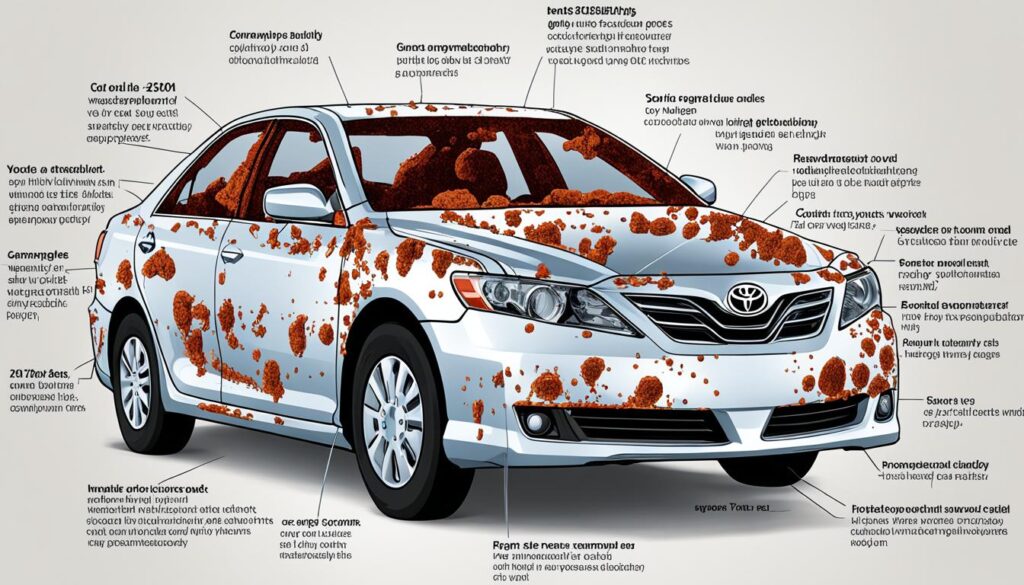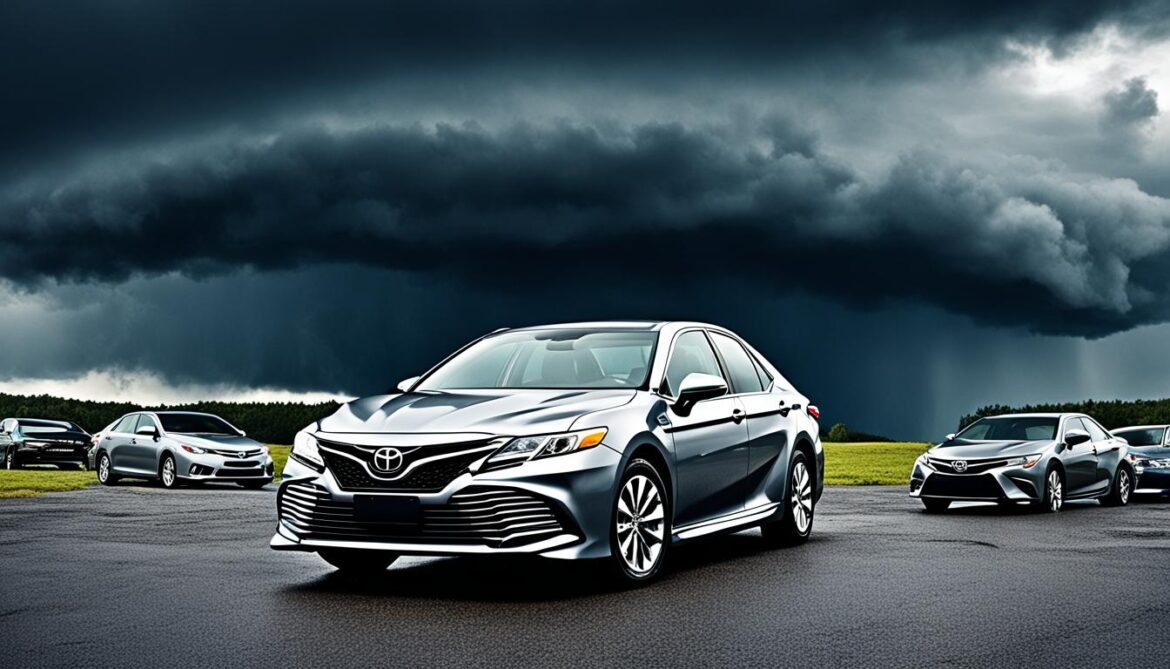Toyota is a renowned automaker known for its reliable and popular Camry model. However, not all Camry years are created equal. It’s essential for buyers to be aware of the troublesome Toyota Camry years to avoid and the models that have proven to be unreliable.
In this comprehensive buyer’s guide, we will delve into the notorious Toyota Camry models and highlight the problematic generations. By doing so, we aim to equip potential buyers with the necessary knowledge to make an informed decision when purchasing a used Toyota Camry.
Key Takeaways:
- Not all Toyota Camry years are trouble-free and reliable.
- It’s important to be aware of the problematic generations to avoid potential issues.
- Researching specific model years will help buyers make informed buying decisions.
- There are reliable Toyota Camry models that provide a durable and dependable driving experience.
- Considering common Camry issues will help buyers prepare for potential maintenance and repairs.
Toyota Camry Years to Avoid: 2007 Model
The 2007 Toyota Camry is notorious for several significant issues, making it a year to avoid. Owners have reported various problems, especially with the automatic transmission, which can lead to lagging acceleration and the need for early replacement. Additionally, many drivers have experienced a faulty check engine light, missed shifting, and power steering issues.
The automatic transmission problems in the 2007 Toyota Camry can result in delayed or rough shifting, potentially compromising the overall driving experience and long-term reliability. Some owners have even had to replace the transmission prematurely due to complete failure.
Another common problem in the 2007 Camry is the malfunctioning check engine light. It can display incorrect information or fail to provide any indication of a potential issue, making it challenging for drivers to address problems proactively.
Power steering issues have also plagued some 2007 Camry models. Drivers have reported a lack of power steering assistance or sudden loss of power steering control, compromising safety and drivability.
Overall, due to the automatic transmission problems, faulty check engine light, and power steering issues, the 2007 Toyota Camry is a year that buyers should steer clear of when searching for a reliable and trouble-free used car option.
| Issues | Symptoms |
|---|---|
| Automatic Transmission Problems | Lagging acceleration, delayed shifting, premature transmission failure |
| Check Engine Light | Incorrect information, lack of indication, failure to illuminate |
| Power Steering Issues | Lack of power steering assistance, sudden loss of power steering control |
Toyo
Toyota Camry Years to Avoid: 2009 Model
When it comes to Toyota Camry models to avoid, the 2009 model definitely falls into that category. Similar to its predecessors, the 2009 Toyota Camry has been plagued by transmission and check engine light problems. Many owners have reported issues with the transmission, including sluggish acceleration and the need for premature replacement. These problems can be costly and cause significant inconvenience.
In addition to transmission troubles, owners of the 2009 Toyota Camry have also experienced recurring check engine light problems. This issue can be frustrating and difficult to diagnose, leading to frequent trips to the mechanic. It’s essential to address check engine light problems promptly to avoid further complications and potential damage to the vehicle’s components.
Furthermore, another recurring problem reported by 2009 Toyota Camry owners is the buildup of engine sludge. This issue is often caused by neglected oil changes or the use of low-quality oil. Engine sludge buildup can lead to poor engine performance, reduced fuel efficiency, and even engine failure if left unaddressed. Regular oil changes are crucial to prevent this problem and maintain the longevity of the engine.
Best Toyota Camry Years: 2004 Model
When considering the best Toyota Camry years, the 2004 model stands out as a reliable and highly rated option. This particular year is known for its exceptional reliability, impressive drivability, and overall customer satisfaction.
Owners of the 2004 Toyota Camry have reported a high level of satisfaction with their vehicles, praising its smooth performance and comfortable ride. The car’s durable build and long-lasting quality have made it a top choice in the used car market.
While some owners have experienced the need for a transmission replacement after reaching high mileage, it is important to note that this does not detract from the overall reliability of the 2004 Toyota Camry. With proper maintenance and care, this model can still provide many years of dependable service.
Best Toyota Camry Years: 2013-2015 Models
The 2013-2015 Toyota Camry models, part of the seventh generation, are considered some of the best years for the Camry. These models have received high reliability ratings, excellent customer satisfaction scores, and minimal recalls. The only reported issue is with the AC system, which may blow hot air after reaching high mileage.
| Model Year | Reliability Rating | Customer Satisfaction Score | Recalls |
|---|---|---|---|
| 2013 | 9.5/10 | 4.8/5 | Minimal |
| 2014 | 9.6/10 | 4.9/5 | Minimal |
| 2015 | 9.4/10 | 4.7/5 | Minimal |
During these years, the Toyota Camry has established itself as a reliable and popular choice among drivers. Its seventh-generation design incorporates updates and improvements that enhance the overall driving experience.
AC System Issues
One reported issue with the 2013-2015 Camry models is related to the AC system. Some owners have experienced the AC system blowing hot air after the vehicle reaches a higher mileage. This problem appears to be relatively rare, but it is recommended to have the AC system serviced regularly and address any potential issues promptly.
Best Toyota Camry Years: 2021 Model
The 2021 Toyota Camry stands out as one of the best years for the model. With a strong focus on improved build quality, enhanced safety features, and a fresh design, the 2021 Camry offers a reliable and enjoyable driving experience. Its reputation for longevity is evident, as this model has the potential to last over 100,000 miles. Let’s explore the key features that make the 2021 Toyota Camry the top choice for discerning buyers.
Build Quality
Toyota has meticulously engineered the 2021 Camry to ensure exceptional build quality. From the materials used in the construction to the precise assembly processes, every aspect is designed to enhance durability and provide a solid foundation for years of trouble-free ownership. The result is a Camry that exudes a sense of robustness and delivers a comfortable and composed ride.
Safety Features
The 2021 Toyota Camry prioritizes safety with its comprehensive suite of advanced safety features. These include Toyota Safety Sense, which encompasses features such as pre-collision warning with pedestrian detection, lane departure alert with steering assist, adaptive cruise control, and automatic high beams. With these cutting-edge technologies, the 2021 Camry offers peace of mind and protection for both driver and occupants.
Improved Design
The 2021 Camry presents a refreshed design that is sleek, modern, and eye-catching. With its bold grille, sculpted body lines, and available sporty accents, the Camry captivates attention on the road. Inside, the cabin blends comfort and style, providing a refined space that is both inviting and practical. The ergonomic layout ensures easy access to controls and a driver-focused experience.
| Key Highlights | Details |
|---|---|
| Build Quality | Improved construction materials and assembly processes |
| Safety Features | Toyota Safety Sense with advanced driver assistance systems |
| Improved Design | Sleek exterior design and refined interior space |
| Reliability | Potential to last over 100,000 miles |
Common Toyota Camry Issues
While the Toyota Camry is generally a reliable car, there are a few common issues that owners may experience. These include excessive oil consumption, transmission problems such as slipping and delayed engagement, AC and heater issues like musty smells and compressor failure, braking system problems, and door lock malfunctions.
If you own a Toyota Camry, it’s important to be aware of these common issues to ensure maintenance and timely repairs. Let’s take a closer look at each problem:
Excessive Oil Consumption
One of the common issues reported by Toyota Camry owners is excessive oil consumption. Some models may require more frequent oil top-ups between regular oil changes. It’s crucial to keep an eye on the oil level and consult a technician if you notice a significant decrease in oil levels.
Transmission Issues
Transmission problems can affect the performance and drivability of a Toyota Camry. Some owners have reported issues such as slipping gears, delayed engagement, or rough shifting. If you experience any of these symptoms, it’s essential to have your transmission inspected by a qualified mechanic.
AC and Heater Problems
AC and heater problems can be frustrating, especially during extreme weather conditions. Some Toyota Camry models may develop issues like musty smells coming from the vents or complete compressor failure. Regular maintenance and inspections can help identify and resolve these issues.
Brakes
The braking system is a critical safety component in any vehicle, and the Toyota Camry is no exception. Some owners have reported problems with brake performance, such as squeaking or grinding noises, reduced braking efficiency, or even premature wear on brake pads and rotors. Regular brake inspections and timely repairs are essential for maintaining optimal braking performance.
Door Lock Malfunction
Door lock malfunctions can be inconvenient and pose a security risk. In some cases, Toyota Camry owners have experienced issues such as doors not locking or unlocking properly or intermittent malfunctions. If you encounter any door lock problems, it’s recommended to consult with a professional to diagnose and rectify the issue.

Conclusion
When purchasing a used Toyota Camry, it is crucial to be well-informed about the years to avoid and the common issues that owners may encounter. Certain Camry models have had transmission problems, engine issues, and other concerns, making it necessary to exercise caution. Nonetheless, there are also reliable Camry models worth considering. In the end, the Toyota Camry remains a durable and dependable car, and with comprehensive research, prospective buyers can find a used model that meets their specific requirements.
By being aware of the Toyota Camry years to avoid, buyers can avoid potential headaches associated with problematic models. It is advisable to steer clear of years such as 2007, 2008, and 2009, which have reported significant issues with transmissions, check engine lights, and engine sludge buildup. On the other hand, models like the 2004, 2013-2015, and 2021 Toyota Camry have established themselves as reliable options, offering high customer satisfaction and exceptional build quality.
While the Toyota Camry is generally a reliable car, it is important to note a few common “Toyota Camry issues” that owners may experience. These include excessive oil consumption, transmission problems such as slipping and delayed engagement, AC and heater issues like musty smells and compressor failure, braking system problems, and door lock malfunctions. By addressing these issues promptly and proactively, owners can ensure a smooth and enjoyable driving experience with their Toyota Camry.
FAQ
Which Toyota Camry years should buyers avoid?
Buyers should avoid the 2007, 2008, and 2009 Toyota Camry models.
What are some common issues with the 2007 Toyota Camry?
The 2007 Toyota Camry has significant problems, including automatic transmission issues, faulty check engine lights, missed shifting, and power steering issues.
What problems are associated with the 2008 Toyota Camry?
The 2008 Toyota Camry has experienced problems with the automatic transmission, ignition coil failures, and check engine light issues.
What issues are commonly reported with the 2009 Toyota Camry?
Common issues with the 2009 Toyota Camry include transmission problems, check engine light issues, and engine sludge buildup caused by unchanged oil.
Which Toyota Camry model is known for its reliability?
The 2004 Toyota Camry is highly rated for its reliability, drivability, and overall customer satisfaction.
What are some of the best Toyota Camry years?
The 2013-2015 Toyota Camry models, part of the seventh generation, are considered some of the best years for the Camry due to their high reliability ratings and minimal recalls. The 2021 Toyota Camry is also a standout year for its improved build quality, increased safety features, and fresh design.
What are some common issues with the Toyota Camry?
Common issues with the Toyota Camry include excessive oil consumption, transmission problems such as slipping and delayed engagement, AC and heater issues like musty smells and compressor failure, braking system problems, and door lock malfunctions.
Is the Toyota Camry a reliable car overall?
Despite the years to avoid, the Toyota Camry is generally a reliable and durable car. With proper research, buyers can find a used model that suits their needs.







